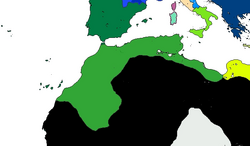| Sultanate of Maghreb سلطنة المغرب Timeline: Principia Moderni IV (Map Game)
OTL equivalent: Barbary Coast | ||||
|---|---|---|---|---|
|
||||
| Mainland Maghreb in 1728
|
||||
| Capital | Fez | |||
| Largest city | Casablanca | |||
| Official languages | Arabic, Berber (candidate) | |||
| Regional languages | Mapuche, African Languages | |||
| Ethnic groups | Berbers, Arabs, Native Laurentians, Sub-Saharans | |||
| Religion | Islam | |||
| Demonym | Maghrebi | |||
The Sultanate of Maghreb is a large, powerful Muslim state in northern Africa. It has a several colonies in Laurentia.
History
Early History
Independence
Maghreb first gained independence from the Rashidun Caliphate after the Second Arab-Ethiopian War.
Zaydi Dynasty
Amin Ayoub (1729-
After the dissolution of the Rashidun Caliphate, the Sultanate gained full independent control other itself and was releases from its tributary vassalised state. Power was quickly consolidated by the Zaydi Dynasty, a powerful elite family, who had ruled Maghreb since 1418. The family was led by Amin bin Ayoub who would assume the title of Sultan. Immediately Sultan Amin began commissioning Berber explorers to establish colonies along the coasts of Cabina and establish a fort in Gambia as part of Amin's successful plan to form Maghrebi Hegemony across Africa.
As noted by many historians, Sultan Amin had an obsession with the establishmed foreign colonies and trade routes across Africa.
Enlightened Era
During these early years, many intellectuals began exporting concepts from European culture and debating them in cities such as Fez. This would become known as the "Enlightened Era" where science and Liberal reforms would begin to boom in the country. Some of these included the formation of a Parliament, discovery and experimentation on Petroleum, the growth of the Reformist Maghrebi Islamic Movement amongst others.
The Sultan, himself, would prove to be a great supporter of the era, and was a patron of many groups formed as a result of the enlightenment. Some of these would later become supporters of the Humanist Revolt in years later.
Maghrebi Subjugation of Mali

Magrehbi Forces fight in the Battle of Tondibi.
Tensions between Maghreb and Mali had been high, ever since the Sultan had accused Mali of practicing a bastardized version of Islam, tainted with Black Magic. Throughout a 4 year period (1730-1734), Maghrebi Pirates attacked and raided Mali ships and initiated a horrific blockade against it.
Finally in 1734, the Sultanate declared War against Mali, sending 75,000 troops invading the country and sail the Navy down the Niger River. These forces would later be reinforced by 100,000 soldiers to help in besieging Tondibi.
The Battle was a landslide victory for Maghreb
Lord Regency Period
However Amin's sanity did not correspond with the prosperity of the nation and finally went insane in the later Golden Age period in 1740, killing himself in the years later. He is succeeded by his son Bamoko, who has virtually no power whatsoever. Instead the country was ruled by the Lord Regent amd the Regency Council, a union of bureaucratic merchants and Berber nobility.

The Lord Regent of Maghreb
The Lord Regent, however was unpopular amongst the masses, due to their image. Many revolutions occurred such as the Humanist Revolt, in which humanist clerks attempted to unseat the Lord Regent by murdering him. In response, the Lord Regent began a "reign of terror" by executing many political opponents.
However following the European Coalition War, the Lord Regent's credibility plummeted and the Lord Regent was deposed in 1755 in a coup led by Yusuf, Amin's son who executed Bamboka in the process.
Restoration of the Monarchy
Military
Army
Pirates
Politics
Administration
Economy
Religion
The main Religion is Islam, which is followed by 97.3% of the population, most of who are devout practicing Muslims along with a minority following the Reformist Maghrebi Islamic Movement. Other smaller minorities include: Jews, Christians and Bahais.
Islam
Islam is the main central religion of the country, it is practiced by 97% of the population, the vast majority of them followers of the Maliki School of Sunni Islam, with small Sufi and Ibadi Branches confined to select areas only. Islam reached Morocco in 680 AD, via the Umayyad Caliphate. The Muslim Establishment in the country led by the Grand Kazir has sizeable amounts of power, despite a history of limitation by the Sultan.

A Group of Kazirs conversing after worshiping in the Grand Mosque of Taza.
Maghrebi Islamic Movement
The Maghrebi Islamic Movement was a Reformist Liberal Islamic Movement that grew in the Maghreb during the Enlightenment Era. Its beliefs, however, do not stray from mainstream Sunni Islamic beliefs, despite slight secularisation.
Despite spreading rapidly in the early 1730s, the movement declined during later years and began to become secluded into the Social Elite of large cities such as Fez and small communities.
Christianity
Christianity a small religion inside the Sultanate, while formerly being quite influential during the Roman Era, following the arrival of Islam, Christianity has declined sharply to the point only having 1% of the population.
Judaism
Judaism is an extremely small religion within the Sultanate, with populations living in select corners of cities, with their largest populations being in Tripoli, Fez and Casablanca.
Bahai
Bahai is a extremely small religion in the country, membership is as low as hundreds of members, despite a small spread in Maghreb.
Relations
Footnotes
| |||||||||||||||||||||||||||||||||||



